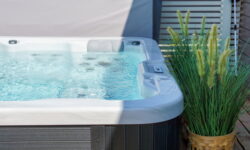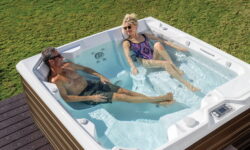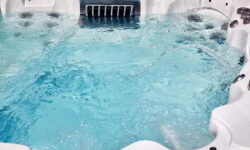Ever wondered why your hot tub’s water level dropped? It’s not magic, it’s evaporation! You’re not alone if you’ve overlooked this common phenomenon.
Yes, hot tub water does evaporate. The heat from the hot tub accelerates this process, causing the water to evaporate more quickly than it would at room temperature. Therefore, if you leave your hot tub uncovered, you may notice a decrease in water level over time due to evaporation.
Understanding how and why hot tub water evaporates can greatly improve your maintenance routine. Let’s dive into the process of evaporation, its impacts, and how you can manage it.
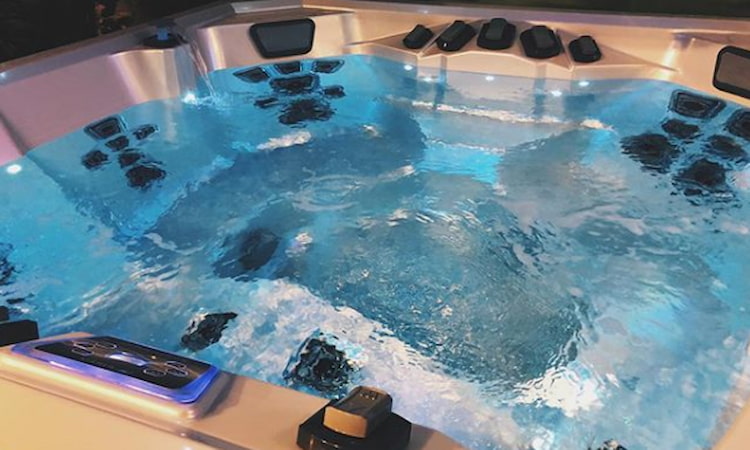
Quick Navigation
- Understanding the Process of Evaporation in Hot Tubs
- Factors Influencing the Rate of Hot Tub Water Evaporation
- Impact of Hot Tub Water Evaporation on Maintenance
- Strategies to Reduce Water Evaporation in Hot Tubs
- Exploring the Environmental Implications of Hot Tub Water Evaporation
- Frequently Asked Questions
- Conclusion
Understanding the Process of Evaporation in Hot Tubs
You’ll need to grasp the evaporation process in hot tubs to fully understand why and how the water level decreases over time.
Evaporation is a natural phenomenon where water transforms from a liquid state to a gaseous state. This happens when water molecules gain enough energy to break free from the liquid form.
Picture yourself lounging in a hot tub. The water’s heat warms you up, right? That same heat is providing energy to the water molecules, causing them to move faster and eventually break away as steam. That’s evaporation in action.
Now, you might wonder, “Why does my hot tub lose water quickly?” Well, several factors contribute to this. The hot tub’s temperature plays a significant role. The higher the temperature, the faster the evaporation. The tub’s surface area also matters – a larger surface area means more space for evaporation to occur.
Furthermore, environmental factors such as wind and humidity can quicken the process. Wind increases evaporation by removing the water vapor from the surface, while low humidity creates more room in the air for water vapor.
Factors Influencing the Rate of Hot Tub Water Evaporation
The temperature of your hot tub and the surrounding environment are two key factors that influence how quickly water evaporates. By understanding these factors, you can manage your hot tub more effectively and reduce water loss.
Firstly, the higher your hot tub temperature, the faster the evaporation. This is due to the increased energy, which enables water molecules to transform into a gaseous state more readily.
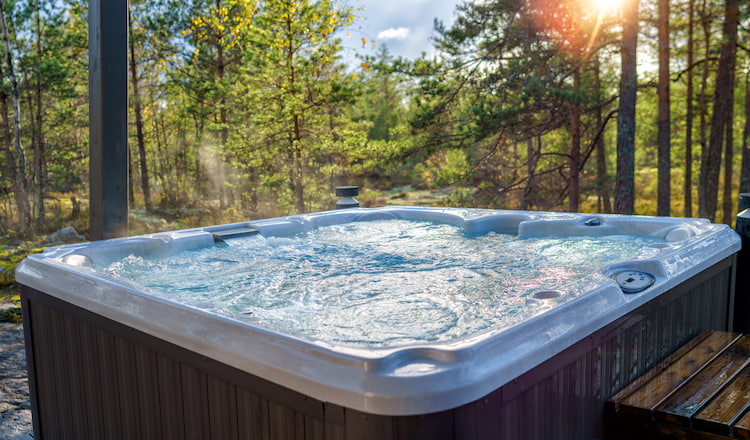
Secondly, the surrounding environment plays a crucial role. If the air is dry, evaporation speeds up, whereas a humid environment slows down the process.
Additionally, exposure to wind and sunlight can also increase the evaporation rate. Wind accelerates evaporation by dispersing the water vapor, making room for more to form. Sunlight, on the other hand, heats the water, thereby increasing the energy of water molecules.
Here’s a quick summary:
| Factor | Effect on Evaporation | Reason |
|---|---|---|
| High Temperature | Increases rate | More energy for water molecules |
| Dry Air | Increases rate | Less moisture in the air |
| Wind/Sunlight | Increases rate | Disperses water vapour/heats up water |
Impact of Hot Tub Water Evaporation on Maintenance
Often, you’ll find that evaporation from your hot tub leads to more frequent maintenance tasks, and it can significantly impact your hot tub’s overall performance. This phenomenon affects your hot tub in two primary ways:
1. Water Level
As water evaporates, the water level in your hot tub decreases. This reduced water volume can cause the pump to work harder than necessary, potentially leading to premature wear and tear.
Solution: Regularly checking and refilling your hot tub maintains optimal water levels and ensures the longevity of your pump.
2. Chemical Balance
Evaporation concentrates the chemicals in your hot tub, making it increasingly harder to maintain a healthy water balance.
Solution: Regular water testing and chemical adjustments are crucial to maintaining the right balance and preventing potential damage to your hot tub’s components and potential health risks to users.
It’s also important to note that using a hot tub cover can significantly slow down evaporation, saving you time and effort in maintenance.
Strategies to Reduce Water Evaporation in Hot Tubs
Let’s now delve into some effective strategies that you can implement to curb water evaporation in your hot tub.
The first tactic that you can apply is using a hot tub cover. This not only keeps debris out but also significantly reduces the rate of evaporation by acting as a physical barrier.
Another method is to adjust the temperature. The warmer the water, the faster it evaporates, so consider lowering the temperature when the tub is not in use.
Lastly, consider the use of a windbreak. This could be in the form of an enclosure or landscaping that blocks the wind, which can speed up evaporation.
Here’s a handy table to summarize these methods:
| Strategy | Description | Effectiveness |
|---|---|---|
| Hot Tub Cover | Acts as a barrier to reduce evaporation | High |
| Adjust Temperature | Lower temperature when not in use to slow evaporation | Medium |
| Windbreak | Use enclosures or landscaping to block wind | Medium |
Exploring the Environmental Implications of Hot Tub Water Evaporation
You might be enjoying your hot tub, but have you considered the environmental implications of water evaporation? It’s not just about the water you’re losing; there’s much more to it.
First, consider the amount of water needed to refill your hot tub. Due to evaporation, you’re constantly topping it off. That’s a considerable amount of water over time, especially in regions where water scarcity is a concern.
Second, think about the energy used to heat the water. The hot water that evaporates takes with it a significant amount of energy. This means your hot tub’s heating system has to work harder and consume more electricity to maintain the desired temperature.
Frequently Asked Questions
Yes, hot tub water evaporation can impact your health. You’re breathing in water vapor, which may contain harmful chemicals or bacteria. This could potentially lead to respiratory issues or skin irritation. Always maintain clean tub water.
Yes, hot tub water evaporation can affect its performance. As water evaporates, it reduces the water level, straining the pump and heater. You’ll need to regularly refill it to maintain optimal functionality.
Indeed, some hot tub models are more prone to water evaporation than others. It’s often due to design features like size, cover quality, and heating mechanisms. Always check these factors before making a purchase.
Yes, there’s a difference. Outdoor hot tubs often evaporate water faster due to exposure to sun and wind. Indoor tubs, shielded from these elements, typically retain water better. So, location definitely affects evaporation rates.
Yes, your hot tub’s water evaporation directly affects its energy consumption. As water evaporates, it cools the remaining water, making the heater work harder to maintain your set temperature, thus consuming more energy.
Conclusion
In conclusion, yes, your hot tub water does evaporate. Factors such as temperature, humidity, wind speed, and tub usage impact the rate.
This evaporation affects your maintenance schedule and can have environmental implications. However, by using strategies like covers and windbreaks, you can significantly reduce water loss.

![How Many Gallons of Water in a Hot Tub? [Different Sized Hot Tubs] how many gallons of water in a hot tub](https://hottubtales.com/wp-content/uploads/2023/10/how-many-gallons-of-water-in-a-hot-tub.jpg)
![Is Yellow Hot Tub Water Safe? [& Treatment Options] is yellow water in hot tub safe](https://hottubtales.com/wp-content/uploads/2023/10/is-yellow-water-in-hot-tub-safe-250x150.jpg)
